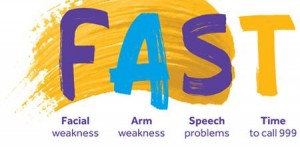Stroke
A stroke is a brain attack
For your brain to function, it needs a constant blood supply, which provides vital nutrients and oxygen to the brain cells. A stroke happens when the blood supply to part of the brain is cut off and brain cells are damaged or die.
Strokes are sudden and have an immediate effect
A person may become numb, weak or paralysed on one side of the body. They may slur their speech and find it difficult to find words or understand speech. Some people lose their sight or have blurred vision, and others become confused or unsteady.
A stroke can damage mind and body
Strokes affect people in different ways, depending on the part of the brain that is affected, how widespread the damage is and how healthy the person was before the stroke. But strokes can damage:
- bodily functions
- our thought processes
- our ability to learn, and
- how we feel and communicate.
Recovering from a stroke takes time
About a third of people who have a stroke make a significant recovery within a month. But most stroke survivors will have long term problems. It may take a year or longer for them to make the best possible recovery. Sadly, in the most severe cases, strokes can be fatal or cause long-term disability.
A stroke is always a medical emergency
It is important to be able to recognise the symptoms of a strokehttp://www.stroke.org.uk/information/about_stroke/recognising_symptoms/index.html and to get help immediately.
You can recognise a stroke using the FAST test
FACIAL weakness: Can the person smile? Has their mouth or eye drooped?
 ARM weakness: Can the person raise both arms?
ARM weakness: Can the person raise both arms?
SPEECH problems: Can the person speak clearly and understand what you say?
TIME to call 999.
If symptoms disappear within 24 hours, the person may have had a Transient ischaemic attach (TIA), which is also called a mini-stroke. A TIA is still a medical emergency, because it can lead to a major stroke.
For more information www.stroke.org.uk
